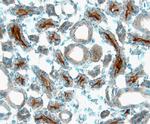Search Thermo Fisher Scientific
- Contact Us
- Quick Order
-
Don't have an account ? Create Account
Search Thermo Fisher Scientific
FIGURE: 1 / 1

In Western blots, no cross-reactivity with recombinant human (rh) Angiopoietin-2 or rhAngoipoietin-3 was observed.
Reconstitute at 0.2 mg/mL in sterile PBS.
Endoxin level is <0.10 EU per 1 µg of the antibody by the LAL method.
Angiopoietin-1 (Ang-1) is a secreted ligand for Tie-2, a cell surface receptor tyrosine kinase expressed in endothelial and hemopoietic cells. Ang-1 is an angiogenic factor that mediates blood vessel maturation and may be involved in endothelial development. A related protein, angiopoietin-2 (Ang-2), is a naturally occurring antagonist of Ang-1 activation of Tie-2. In adult tissue, Ang-2 expression is restricted to sites of vascular remodeling. Ang-3 and Ang-4 represent the mouse and human counterparts of the same gene locus. The structural divergence of Ang-3 and Ang-4 cause their divergent functions. Ang-3 and Ang-4 have very different distributions in their respective species, and Ang-3 appears to act as an antagonist while Ang-4 appears to function as an agonist. Ang-3 and Ang-4 share all the main structural characteristics of Ang-1 and Ang-2 and are homologous throughout the signal peptide, N-terminal region, coiled-coil segment and Fibrinogen-like domain.
For Research Use Only. Not for use in diagnostic procedures. Not for resale without express authorization.
Protein Aliases: AGP4; ANG-3; ANG-4; angiopoietin 3; Angiopoietin-3; Angiopoietin-4; Angiopoietin3; Angiopoietin4
Gene Aliases: Agpt4; Ang3; Angpt4
UniProt ID: (Mouse) Q9WVH6
Entrez Gene ID: (Mouse) 11602
Molecular Function:
![]() intercellular signal molecule
intercellular signal molecule

If an Invitrogen™ antibody doesn't perform as described on our website or datasheet,we'll replace the product at no cost to you, or provide you with a credit for a future purchase.*
Learn more
Get expert recommendations for common problems or connect directly with an on staff expert for technical assistance related to applications, equipment and general product use.
Contact tech support